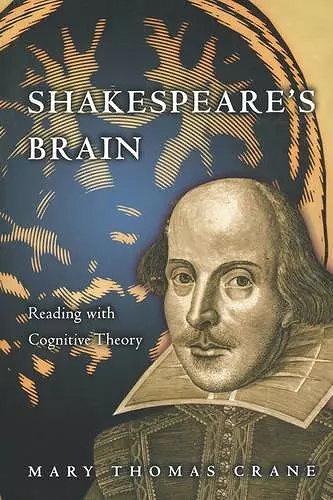Shakespeare's Brain
Reading with Cognitive Theory
Format:Paperback
Publisher:Princeton University Press
Should be back in stock very soon

Shakespeare's Brain will inevitably be described as a 'cognitive' analysis because it pays attention to cognitive aspects of meaning, but it is no less 'historical,' 'theoretical,' and 'nterpretive'. The book gives rich treatments of the historical aspects of the plays and their production, the history of criticism, and literary theory. To this richness it adds the embodied mind of the writer writing, and the ways in which the plays investigate what is involved in conceiving of oneself as an embodied mind. Shakespeare's Brain offers old wine (Shakespeare) in new bottles (cognitive science), giving us not only a picture of the future of cognitive literary study but also some valuable new interpretations of the plays. -- Mark Turner, University of Maryland Mary Thomas Crane lays out with easy authority and admirable lucidity what criticism might hope to gain from considering the insights of cognitive neuroscience. Taking on a wide range of experimental and theoretical cognitive science as well as the beginnings of its absorption into historical and literary studies, she proves to be a gifted explainer. Moreover, her 'adjustment' of Saussure, Lacan, and Derrida has an unassuming brilliance, bold but modestly teacherly, controversial without being controversialist. -- James Richardson, Princeton University The implications of Mary Thomas Crane's approach are manifold and momentous, and she presents these in an introduction as striking for its lucidity as for its significance. Crane's scholarship is rich and extensive, and the book is beautifully written. -- Judith H. Anderson, Indiana University
Considers the brain as a site where body and culture meet to form the subject and its expression in language. This book takes Shakespeare as a case study, and demonstrates the explanatory power of cognitive theory. It reveals in Shakespeare's texts a web of structures and categories through which meaning is created.Here Mary Thomas Crane considers the brain as a site where body and culture meet to form the subject and its expression in language. Taking Shakespeare as her case study, she boldly demonstrates the explanatory power of cognitive theory--a theory which argues that language is produced by a reciprocal interaction of body and environment, brain and culture, and which refocuses attention on the role of the author in the making of meaning. Crane reveals in Shakespeare's texts a web of structures and categories through which meaning is created. The approach yields fresh insights into a wide range of his plays, including The Comedy of Errors, As You Like It, Twelfth Night, Hamlet, Measure for Measure, and The Tempest. Crane's cognitive reading traces the complex interactions of cultural and cognitive determinants of meaning as they play themselves out in Shakespeare's texts. She shows how each play centers on a word or words conveying multiple meanings (such as "act," "pinch," "pregnant," "villain and clown"), and how each cluster has been shaped by early modern ideological formations. The book also chronicles the playwright's developing response to the material conditions of subject formation in early modern England. Crane reveals that Shakespeare in his comedies first explored the social spaces within which the subject is formed, such as the home, class hierarchy, and romantic courtship. His later plays reveal a greater preoccupation with how the self is formed within the body, as the embodied mind seeks to make sense of and negotiate its physical and social environment.
"Shakespeare's Brain will inevitably be described as a 'cognitive' analysis because it pays attention to cognitive aspects of meaning, but it is no less 'historical,' 'theoretical,' and 'nterpretive'. The book gives rich treatments of the historical aspects of the plays and their production, the history of criticism, and literary theory. To this richness it adds the embodied mind of the writer writing, and the ways in which the plays investigate what is involved in conceiving of oneself as an embodied mind. Shakespeare's Brain offers old wine (Shakespeare) in new bottles (cognitive science), giving us not only a picture of the future of cognitive literary study but also some valuable new interpretations of the plays."—Mark Turner, University of Maryland
"Mary Thomas Crane lays out with easy authority and admirable lucidity what criticism might hope to gain from considering the insights of cognitive neuroscience. Taking on a wide range of experimental and theoretical cognitive science as well as the beginnings of its absorption into historical and literary studies, she proves to be a gifted explainer. Moreover, her 'adjustment' of Saussure, Lacan, and Derrida has an unassuming brilliance, bold but modestly teacherly, controversial without being controversialist."—James Richardson, Princeton University
"The implications of Mary Thomas Crane's approach are manifold and momentous, and she presents these in an introduction as striking for its lucidity as for its significance. Crane's scholarship is rich and extensive, and the book is beautifully written."—Judith H. Anderson, Indiana University
ISBN: 9780691069920
Dimensions: unknown
Weight: 369g
288 pages